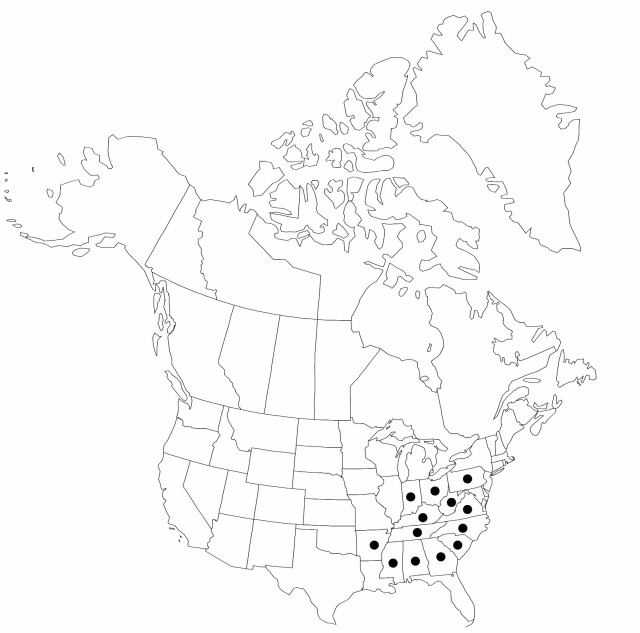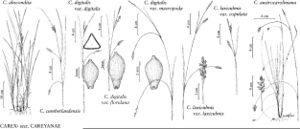Difference between revisions of "Carex cumberlandensis"
Sida 19: 994, figs. 1–5, 7. 2001.
imported>Volume Importer |
GeoffLevin (talk | contribs) m (Restored missing comma in authority) |
||
| (One intermediate revision by one other user not shown) | |||
| Line 1: | Line 1: | ||
{{Treatment/ID | {{Treatment/ID | ||
|accepted_name=Carex cumberlandensis | |accepted_name=Carex cumberlandensis | ||
| − | |accepted_authority=Naczi Kral & Bryson | + | |accepted_authority=Naczi, Kral & Bryson |
|publications={{Treatment/Publication | |publications={{Treatment/Publication | ||
|title=Sida | |title=Sida | ||
| Line 31: | Line 31: | ||
-->{{#Taxon: | -->{{#Taxon: | ||
name=Carex cumberlandensis | name=Carex cumberlandensis | ||
| − | |authority=Naczi Kral & Bryson | + | |authority=Naczi, Kral & Bryson |
|rank=species | |rank=species | ||
|parent rank=section | |parent rank=section | ||
| Line 45: | Line 45: | ||
|publication year=2001 | |publication year=2001 | ||
|special status= | |special status= | ||
| − | |source xml=https:// | + | |source xml=https://bitbucket.org/aafc-mbb/fna-data-curation/src/2e0870ddd59836b60bcf96646a41e87ea5a5943a/coarse_grained_fna_xml/V23/V23_815.xml |
|genus=Carex | |genus=Carex | ||
|section=Carex sect. Careyanae | |section=Carex sect. Careyanae | ||
Latest revision as of 22:53, 8 December 2021
Plants densely cespitose, from short rhizomes. Culms erect or ascending, 7–27 cm × 0.4–0.7 mm; vegetative shoots taller than culms, (1.4–)1.7–3.7(–4.9) times as tall as tallest flowering culm; blades of vegetative shoots 1–3.5 times wider than bract blades. Leaves: basal sheaths white to light brown; nonbasal sheaths 2.1–10.6 mm; blades erect, drooping or recurved, dark green, 0.4–52 cm × 1.6–6.1 mm, usually exceeding culms. Inflorescences: spikes (3–)4 per culm, scattered; peduncles of proximal pistillate spikes drooping, to 9.1 cm; bracts dark green, 10–28 cm × 1.8–5.9 mm, well developed, blade of distal lateral spike (12–)17–51 times as long as wide. Pistillate spikes: the proximal usually, usually basal, the distal sessile to very short pedunculate, often hidden in foliage, 5.3–17 × 2.8–4.1 mm. Staminate spike sessile or nearly so, (8.3–)9.6–16(–21.1) × 0.6–1.3 mm, often hidden by distal bract and/or pistillate spikes. Pistillate scales 1.3–2.2 × 1.4–2.1 mm, midribs green, margins hyaline, apex acute, proximal scales of lateral spikes subtending perigynia. Staminate scales (2.6–)2.8–3.5(–3.8) × 1.1–1.7 mm, midribs green, margins hyaline, apex obtuse. Anthers 1.2–1.8 mm. Perigynia 4–8(–9) per spike, distichously overlapping, finely veined, obovoid, 2.9–3.8 × 1.5–2.1 mm; beak tapering. Achenes ellipsoid, 2.2–2.9 × 1.4–1.8 mm, sides flat at maturity, filling perigynia. Style tapering from swelling just beyond attachment to achene, bent, ascending through entire orifice.
Phenology: Fruiting spring.
Habitat: Mesic, deciduous or mixed deciduous-evergreen forests, often calcareous soils
Elevation: 200–1200 m
Distribution

Ala., Ark., Ga., Ind., Ky., Miss., N.C., Ohio, Pa., S.C., Tenn., Va., W.Va.
Discussion
Selected References
None.
